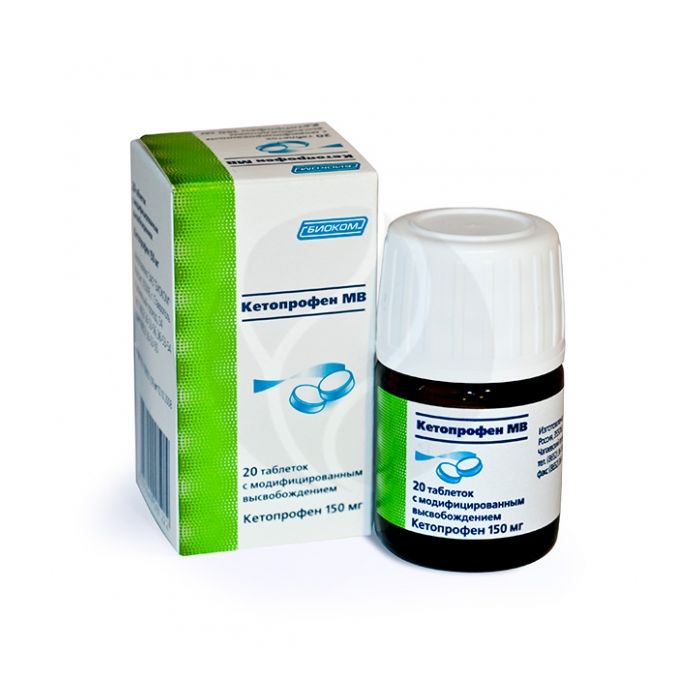Ketoprofen MB tablets 150mg, No. 20
Expiration Date: 05/2027
Russian Pharmacy name:
Кетопрофен МВ таблетки 150мг, №20
Articular syndrome (rheumatoid arthritis, osteoarthritis, ankylosing spondylitis, gout); symptomatic treatment of inflammatory and degenerative diseases of the musculoskeletal system (periarthritis, arthrosynovitis, tendinitis, tendosynovitis, bursitis, lumbago), back pain, neuralgia, myalgia.
Uncomplicated injuries, in particular sports, dislocations, sprains or ruptures of ligaments and tendons, bruises, post-traumatic pain.
As part of the combined therapy of inflammatory diseases of the veins, lymphatic vessels, lymph nodes (phlebitis, periphlebitis, lymphangitis, superficial lymphadenitis).
Inside, during or after meals, 1 tablet (150 mg) 1 time per day. The tablets should be swallowed whole, without chewing, with a large amount (at least 100 ml) of water or milk. The minimum effective dose should be used for the shortest possible short course.
Modified release tablets
ketoprofen
Erosive and ulcerative lesions of the gastrointestinal tract in the acute phase,
'aspirin triad',
severe liver and / or kidney dysfunction;
III trimester of pregnancy;
age up to 15 years (for retard tablets);
hypersensitivity to ketoprofen and salicylates.
pharmachologic effect
NSAID, a derivative of propionic acid. It has analgesic, anti-inflammatory and antipyretic effects. The mechanism of action is associated with inhibition of the activity of COX, the main enzyme of the metabolism of arachidonic acid, which is a precursor of prostaglandins, which play a major role in the pathogenesis of inflammation, pain and fever. The pronounced analgesic effect of ketoprofen is due to two mechanisms: peripheral (indirectly, through suppression of prostaglandin synthesis) and central (due to inhibition of prostaglandin synthesis in the central and peripheral nervous system, as well as the effect on the biological activity of other neurotropic substances that play a key role in the release of pain mediators in the spinal cord). brain). In addition, ketoprofen has anti-bradykinin activity, stabilizes lysosomal membranes,causes a significant inhibition of neutrophil activity in patients with rheumatoid arthritis. Suppresses platelet aggregation.
Pharmacokinetics
When taken orally and rectally, ketoprofen is well absorbed from the gastrointestinal tract. Cmax in plasma when taken orally is achieved after 1-5 hours (depending on the dosage form), with rectal administration - after 45-60 minutes, intramuscular injection - after 20-30 minutes, intravenous administration - after 5 minutes. Plasma protein binding is 99%. Due to pronounced lipophilicity, it quickly penetrates the BBB. Css in blood plasma and cerebrospinal fluid lasts from 2 to 18 hours. Ketoprofen penetrates well into the synovial fluid, where its concentration exceeds that in plasma 4 hours after administration. It is metabolized by binding to glucuronic acid and to a lesser extent by hydroxylation. It is excreted mainly by the kidneys and to a much lesser extent through the intestines. T1 / 2 of ketoprofen from plasma after oral administration is 1.5-2 hours,after rectal administration - about 2 hours, after intramuscular administration - 1.27 hours, after intravenous administration - 2 hours.
Side effect
From the digestive system: pain in the epigastric region, nausea, vomiting, constipation or diarrhea, anorexia, gastralgia, liver dysfunction; rarely - erosive and ulcerative lesions of the gastrointestinal tract, bleeding and perforation of the gastrointestinal tract. From the side of the central nervous system: headache, dizziness, tinnitus, drowsiness. From the urinary system: renal dysfunction. Allergic reactions: skin rash; rarely - bronchospasm. Local reactions: when used in the form of suppositories, irritation of the rectal mucosa, painful defecation is possible; when applied in the form of a gel - itching, skin rash at the site of application.
Application during pregnancy and lactation
Contraindicated for use in the third trimester of pregnancy. In the I and II trimesters of pregnancy, the use of ketoprofen is possible in cases where the potential benefit to the mother outweighs the potential risk to the fetus. If it is necessary to use ketoprofen during lactation, it is recommended to stop breastfeeding.
Application for violations of liver function
Contraindications for oral administration are severe liver dysfunction.
Use with extreme caution in patients with liver disease. In the course of treatment, systematic monitoring of liver function is necessary.
Application for impaired renal function
Contraindications for oral administration are severe renal dysfunction. Use with extreme caution in patients with kidney disease. In the course of treatment, systematic monitoring of renal function is necessary.
Application in children
Contraindicated under the age of 15 years (for retard tablets).
Special instructions Use with extreme caution in patients with liver and kidney diseases, a history of gastrointestinal tract diseases, dyspeptic symptoms, immediately after major surgical interventions. In the course of treatment, systematic monitoring of liver and kidney function is required.
Drug interactions
With the simultaneous use of ketoprofen with other NSAIDs, the risk of developing erosive and ulcerative lesions of the gastrointestinal tract and bleeding increases; with antihypertensive drugs (including with beta-blockers, ACE inhibitors, diuretics) - it is possible to reduce their action; with thrombolytics - an increased risk of bleeding. With simultaneous use with acetylsalicylic acid, it is possible to reduce the binding of ketoprofen to blood plasma proteins and increase its plasma clearance; with heparin, ticlopidine - increased risk of bleeding; with lithium preparations - it is possible to increase the concentration of lithium in the blood plasma to toxic by reducing its renal excretion. With simultaneous use with diuretics, the risk of developing renal failure increases due to a decrease in renal blood flow,due to inhibition of prostaglandin synthesis, and against the background of hypovolemia. With simultaneous use with probenecid, it is possible to reduce the clearance of ketoprofen and its binding to blood plasma proteins; with methotrexate - it is possible to increase the side effects of methotrexate. With the simultaneous use of warfarin, the development of severe, sometimes fatal bleeding is possible.
'
